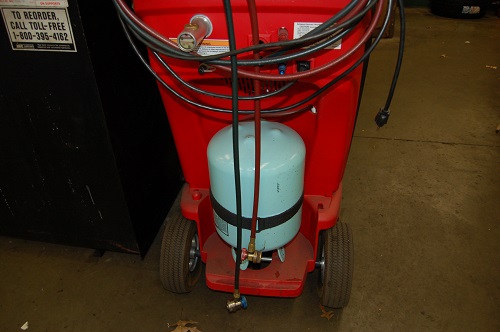Talking refrigerant safety
By Richard Hawkins, MACS contributor
Note: This is a continuation of last week’s article about refrigerant safety. If you haven’t already read that article, it can be found at this link.
It was recapping a conversation that took place several years ago with a customer about the use of some highly flammable refrigerant.
The last line of the conversation covered in the article stated the following:
Me: I know that is a huge increase percentage wise but you’re in the same boat as everyone else doing A/C work, so it isn’t something that is going to put you at a competitive disadvantage.
Can I ask you a question?

Now we will pick up where we left off.
Shop Owner: Sure.
Me: What is the average amount of a repair order for A/C work at your shop?
Shop Owner: I don’t know right off the top of my head. It can vary from $50.00 for some diagnostics and a recharge up to over $1000.00 for a compressor job. (NOTE: Remember this was the mid 2000s and A/C work cost less then.)
Me: OK. What if we use $500.00 as the average amount of an A/C work order?
Shop Owner: OK.
Me: What would you say is the average refrigerant capacity of the A/C systems you work on?
Shop Owner: Refrigerant capacities can vary quite a bit. There are some now that only hold a pound and then you have those dual systems that hold about 3 pounds.
Me: Yes, they do vary. How about if we use 1 1/2 pounds as the average size system. (The average size system is smaller than that now. But remember this was the mid 2000s.)
Shop Owner: OK
Me: Last year at $100.00 for a 30-pound cylinder, 1 1/2 pounds of R-134a would have cost you about $5.00. This year at $300.00 for a 30-pound cylinder, 1 1/2 pounds of R-134a will cost you about $15.00. That of course is $10.00 more. That is three times as much, but it is only a small percentage of the total amount of the work order.
I won’t complicate this by getting into what you retailed refrigerant for last year or what you would be retailing it for this year, but a $10.00 increase in parts or supplies for a $500.00 job is 2%. If the price of a compressor or other part increased by $10.00 you wouldn’t think twice about.
You would just apply your standard profit margin to the higher priced part. That’s what most shops will be doing with the higher priced refrigerant. With the potential problems that the use of highly flammable refrigerants can cause, it isn’t worth it to try to save $10.00.
Shop Owner: That is a good point, but I feel like I’m getting ripped off paying $300.00 for a jug of R-134a. I’m going to talk to the guy that sells the new refrigerant again before I decide.
(Despite so many compelling reasons not to use this highly flammable refrigerant, I hadn’t been able to get the message across, so I decided to try a different approach.)
Me: Can I ask you another question?
Shop Owner: Sure.
Me: You’ve taken time to talk to me about this and plan to get some more information from the guy who is selling this refrigerant before you decide. That indicates to me that you’re someone who also likely gets as much information as possible about the nature of an A/C problem before you start any sort of diagnostics.
Shop Owner: Absolutely. The more information you have the better.
Me: OK. So, let’s say I brought my car in to your shop with an A/C problem and described what was going on with it. You might ask me if myself or someone else had worked on it. Right?
Shop Owner: Yes.
Me: Suppose I told you that I had rigged up a hose and some adapters and connected the A/C system to the tank on my barbeque grill and charged it up?
Shop Owner: OK. I see what you mean. I wouldn’t want to work on your car and since you stated it like that, I think I will be better off if I steer clear of this stuff. Thanks for taking the time to call me.
Me: You’re welcome.
Join MACS to be a part of a like-minded community of mobile A/C professionals and stay aware of what’s new in our rapidly changing industry.
